The year in books
- Published
What did I learn from 2013's crop of political books?
It turns out some not very nice things were happening at the top of the Labour government; Benjamin Disreali was a bit of a one; Peers very seldom wear ermine and do a lot of work when no-one's looking; Sir Fred Goodwin spent a small fortune repainting the Royal Bank of Scotland's fleet of corporate Mercedes in the exact shade of blue on the RBS logo; fundraising for British political parties remains murky; governments of all colours keep on making the same expensive mistakes, and Nick Clegg played a very cunning game forming the Coalition…
One of the joys of presenting BBC Parliament's BOOKtalk is that I get to browse across subjects way beyond the immediate Westminster bubble "must read" list.
But for me the undisputed political book of the year has to be the book at the top of that list - disgraced spin doctor Damian McBride's occasionally terrifying account of his life and work in the court of Gordon Brown.
McBride... or McNasty, or McPoison, was a high functioning alcoholic when he became Chancellor, then Prime Minister Brown's conduit to the press, and a key player in the factional New Labour wars between Blairites and Brownites.
He gives an achingly vivid account of his role in New Labour's palace intrigues in his confessional memoir, Power Trip.
And he managed to shock even Westminster insiders who'd had an occasional glimpse of his activities.
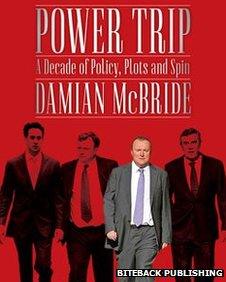
Is it totally candid?
Probably not. Few in Westminster give away all their secrets, if only out of self-preservation.
But there are enough accounts of systemic leaking and brutal smears to provide a horribly revealing insight into the seamy side of political life.
And it's very well written.
The centrepiece is a devastating portrait of Gordon Brown, the leader in whose name McBride leaked and smeared.
It is warts 'n all stuff, tantrums and blame games, and ruthless court politics as well as flashes of leadership at the height of the credit crunch.
And there is a glimpse of the praetorian guard of young(ish) men around Brown, men who make up the politiburo of the post-Brown Labour Party: Ed Balls, Douglas Alexander and Ed Miliband, all jockeying for position.
The moment when Ed Miliband turns on McBride and refuses to believe he wasn't behind a leak against him is reminiscent of Prince Hal cutting Falstaff - "I know you not, old man..."
There's a sense of McBride trying to purge his conscience through confession, and maybe establish himself as a kind of guru for recovering spin doctors, but I think it will be a long time before he's forgiven on earth, if not in heaven.
Less gaudy is Matthew D'Ancona's inside story of the Coalition - In It Together.
His central revelation is that the Conservative leadership always expected it might have to make a post-election deal with the Lib Dems, and had done a lot of the policy, if not personal groundwork.
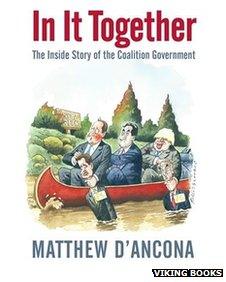
D'Ancona is obviously well plugged into the Camerons, at a personal as well as journalistic level, and the book is very much a Camerons-eye-view of events, with the quality of insider information from the Lib Dem side somewhat thinner.
The aim is clearly to provide the kind of insider account that Bob Woodward has written about successive US presidents, or Andrew Rawnsley gave of the Blair years.
But despite the sheer unfamiliarity of the Coalition, and the inherent divisions of a multi-party government, the result is somehow less gaudy.
Maybe the sheer venom of New Labour's tribal factionalism just isn't there.
Maybe, through force of circumstance the Coalition is simply more earnest.
But you do get a flavour of a government of chums, at least at the very centre - a social circle, D'Ancona says, before they became a political faction.
Required reading, but not the last word.
A less flattering view of the Coalition, or at least of its genesis comes from the Labour former transport secretary, Lord Andrew Adonis, who was a player in the frenetic negotiations which followed the 2010 election.
His book, Five Days in May traces the drama hour by hour, meeting by meeting, even text by text capturing the weird combination of fizzing excitement and total exhaustion both of the politicians and the media, following that gruelling campaign.
The villain of the piece, as he tells the tale, is Nick Clegg, who stands accused of being determined to join up with the Tories from the first, when a rainbow Coalition with Labour, eked out by the votes of smaller parties, was a genuine alternative.
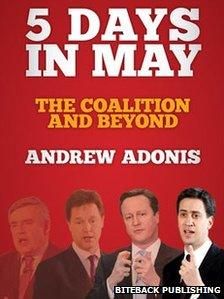
I've never quite been able to buy this argument.
First, Clegg would have had to be prepared to sustain Gordon Brown in power for months, perhaps more than a year, when Labour had clearly lost the election, even if no-one had won it.
Second, a Lab-Lib combination would not have had a majority in the Commons - so it would have had to live hand to mouth, relying on the Northern Irish, the SNP and the rest, and prone to extortion at every turn.
Third, I'm not convinced Brown could have delivered his own party.
Maybe there were some left of centre soul-mates who could link hands across the Lib-Lab divide, but there were plenty on the Labour side in particular who loathed the Libs...
Fourth, if Brown was to go as Prime Minister, even after a few months, who would succeed him?
The Libs were being asked to buy a pig in a poke....
For all those reasons I find it hard to believe a Lib-Lab coalition would have been feasible, able to rise to the gravity of the economic crisis, or able to last very long at all.
The idea that if only Nick Clegg could have linked hands with Gordon Brown, the sundered tribes of the centre left could have united, the music would have come up and we would all have lived happily ever after, strikes me as quite fanciful.
But the speculation along these lines is almost the least important part of the book - it's fascinating about the mechanics of coalition negotiating (there's a wonderful moment when Peter Mandelson resorts to texting a Lib Dem negotiator sitting across a table from him, to try and get one of his colleagues to calm down....).
Adonis is critical of the final shape of the deal suggesting one of Clegg's biggest mistakes was failure to demand control of a big spending department, presumably health or education.
It's a fair bet that if the electorate vote in another hung parliament Adonis will find himself in another set of conference rooms, for another five days in May in 2015...
On the biography front, I enjoyed Douglas Hurd and Edward Young's Disreali, or, the Two Lives.
Some years ago, when he'd written his earlier book on Peel, Lord Hurd appeared on BOOKtalk and spent much of the programme laying into Disreali for destroying his hero, who was, he said, a much better man and a much braver politician.
His view hasn't changed and the Disreal who emerges from this rollicking account of Victorian politics is no statesman, merely a pot-boiler novelist, a sexual chancer, a cynical charmer and a political dilettante.
A more po-faced biography is Scott Berg's monumental account of a highly significant, but almost forgotten US President, Woodrow Wilson.
The astonishing tale of the stern academic who was catapulted to the governorship of New Jersey and then, almost without a pause, into the White House has very few parallels anywhere in political history.
Machine politicians wanted Wilson to be a Mr Clean front-man for politics as usual. Not only could they not control him, but they found themselves outmanoeuvred and side-lined.
Wilson was an effective reformer at state and national level and eventually - despite his slogan of "too proud to fight" - took America into the First World War.
He tipped the balance of the War and tried to shape the peace.
But then we come to one of the great "what-ifs" of US history.
Just as it looked as if he might persuade a reluctant country to join his creation, the League of Nations, he was laid low by a stroke.
For months his wife Edith governed the country through his staff - so that some scholars credit her with being the first woman president.
And by the time he recovered his enemies had defeated his plan, and America sank back into isolationism until 1940.
The best book by an MP this year is Conundrum, by the Conservative MP Richard Bacon, who sits on Parliament's formidable financial watchdog, the Public Accounts Committee.
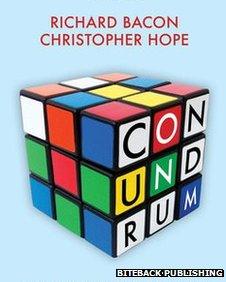
His book poses the question why does every government get things wrong and what can be done about it?
Bacon yomps through a series of hyper-expensive public policy disasters: the National Programme for IT in the NHS; the Rural Payments Agency; the FE college building programme; recruitment of student doctors; the Child Support Agency.
And as each is examined there's a sense of déjà vu all over again, as the same mistakes are repeated.
His answers revolve around proper lines of accountability and clarity in setting objectives - but the clash between the demands of politics and of proper management are harder to resolve.
Anyone who wants to be in government - and anyone who already is should read this book.
The best book on Parliament is constitutional scholar Meg Russell's look at the modern upper house, the Contemporary House of Lords.
It can be a majestic sight... that glittering chamber full of gilt and heraldry, the hundreds of peers in their scarlet ermine-trimmed robes, but its actual work is poorly understood outside its own Chamber, even a few yards away in the Commons.
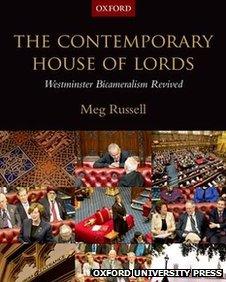
She describes an increasingly powerful and assertive House of Parliament, which has learned how to deploy its limited power to considerable effect and has become a shaper of laws and a dangerous nuisance - or should that be candid friend to ministers.
This shines a light on a seldom-examined but vital part of our law-making.
For those who like their history a little more distant, Tudor historian turned Tory MP Chris Skidmore has produced Bosworth the Birth of the Tudors - an account of the defeat and death of Richard III who was hacked to death in a Leicestershire field, fighting to defend his crown.
Legend has it that the crown in question was plucked from a bush and presented to his successor, ushering in a new era and a new dynasty...
Interest in the last Plantagenet monarch has been revived by the discovery of his body beneath a Leicester car park, and by evidence that he was indeed deformed, by a spinal condition, even if he wasn't the crookback of Shakespeare's plays.
Skidmore, the author of several books on Tudor history, has produced a lucid account of the successful invasion by the future Henry VII, recounting the manoeuvres and politicking around the doomed Yorkist regime, as Henry marched through Wales gathering support for his bid for the crown.
He's now working on a full-dress biography of Richard III and has even found some new source material to draw on.
I'm looking forward to the result...